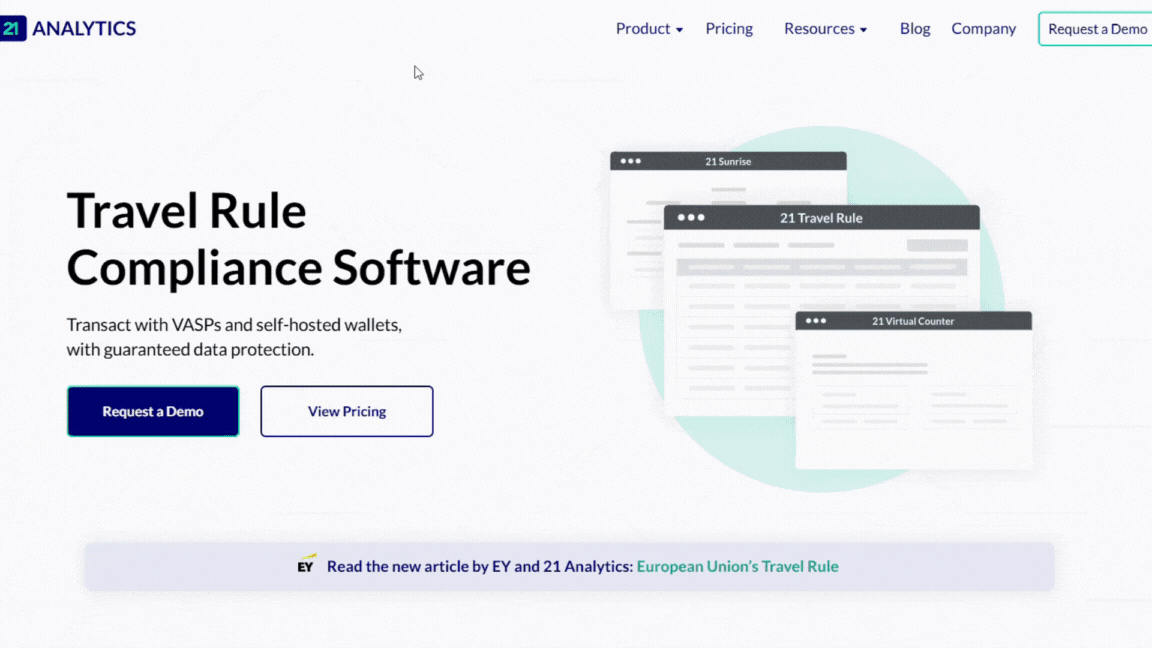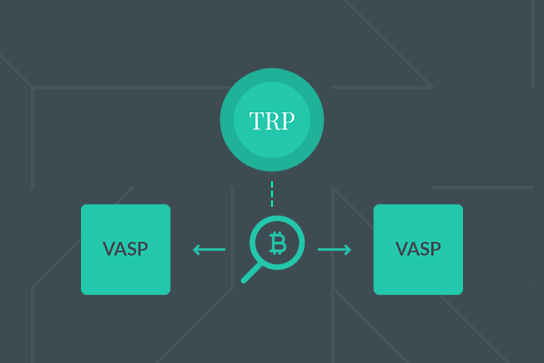
TRP: Solving Key Travel Rule Compliance Issues
The Travel Rule Protocol (TRP) is 21 Analytics’ protocol of choice for our Travel Rule solution, 21 Travel Rule. In this blog, we explain TRP, how it meets the Travel Rule’s requirements, and why it is the choice of many top banks and VASPs.
What Is TRP?
The Travel Rule Protocol, TRP, is an open standard for exchanging digital-asset transfer-related data between VASPs as required by the FATF Travel Rule.
It is an entirely royalty-free specification - nobody owns it - and without any hidden catches, neither does it depend on any centralised third-party services.
As nobody owns TRP, the industry (Travel Rule solution developers, VASPs, compliance officials, etc.) makes all decisions related to its development, resulting in a standard tailored to the industry’s needs. Every feature that TRP boasts has been developed due to Travel Rule demand.
Find Answers to Everything TRP
How Does TRP Solve the Travel Rule’s Requirements?
In their most recent Targeted Update, the FATF noted that some Travel Rule solutions are still not compliant with the Travel Rule’s requirements. Examples included:
Failure to exchange required Travel Rule information according to regulations,
Incorrect timing of data transmission,
Facilitating transfers to sanctioned addresses and countries,
Lack of VASP discovery,
Limited asset support.
TRP addresses all these shortcomings. Moreover, the standard is so intuitive that it all happens behind the scenes, as the processes are completely automated.
Learn More about TRP
TRP and the Failure to Exchange Required Travel Rule Information
The Travel Rule mandates that originating and beneficiary VASPs collect, verify, and securely exchange customer information to ensure compliant digital asset transactions.
This includes variations of full names, transaction IDS, VASP account numbers, and additional identifying details such as physical addresses, national IDs, or dates and places of birth, and in the case of the TFR, LEIs are to be provided.
Failure to securely verify and share this data prevents transactions from being processed. With TRP, VASPs cannot proceed with a transaction unless this data is provided. Thus, VASPs can authenticate counterparties' information reliably and meet regulatory requirements, mitigating risks associated with relying solely on unverified data during virtual asset transfers.
TRP and the Incorrect Timing of Data Transmission
Timing is a critical factor in Travel Rule compliance, as the prompt exchange of information allows VASPs to address potentially suspicious digital asset transfers effectively. To meet these requirements, Travel Rule data must be shared before or alongside transactions while adhering to regional data protection regulations.
TRP upholds this requirement with its Accept or Reject functionality: VASPs can authorise or reject inbound transactions before any on-chain activity. This feature ensures that VASPs not only receive the required Travel Rule data before any blockchain activity occurs but can also verify whether the complete data set was received. In the case of missing data, they can immediately request it or hold the transaction until received.
Moreover, this feature encourages VASPs to conduct additional due diligence before allowing the transaction to be processed, further avoiding transactions with addresses linked to sanctioned entities, individuals and countries.
Read: TRP Lets VASPs Accept or Reject Transfers Before They Occur
TRP and the Lack of VASP Discovery
The FATF has specified, along with various other Travel Rule implementations, that VASPs must know who their counterparty is before a transaction can occur. This introduces the conundrum of how a VASP can ascertain this information without hindering its users’ experience while obtaining a reliable answer.
TRP has solved this with its Travel Address. By sending or receiving a Travel Address to or from an unknown counterparty, a receiving VASP immediately knows who their counterparty is without having to ask their customer or rely on any VASP networks.
In fact, the Travel Address allows for automatic identification of this counterparty as it contains identifiers that a standard wallet address does not contain, like the VASP, which controls the receiving address and the URL to receive the Travel Rule data.
Read: 21 Travel Rule's VASP Auto-discovery Assists VASPs
TRP and Limited Asset Support
As the Travel Rule extends to every digital asset and not a select few, Travel Rule solutions must support all assets, no matter how exotic. Failure to support every asset is an example of non-compliance.
To tackle this issue, TRP was the first protocol to adopt the Digital Token Identifier Foundation (DTIF) managed ISO 24165 and now supports over 2400 digital assets, with this list frequently increasing. Moreover, this list of assets extends to stablecoins, utility tokens, virtual currencies, tokenised financial instruments, and e-money tokens.
Read: 21 Analytics Supports over 2400 Crypto Assets Leveraging DTI

Why Top Banks and VASPs Choose TRP
TRP is one of the only decentralised protocols available for Travel Rule solutions that is 100% compliant with the FATF’s recommendations and more stringent Travel Rule implementations like the TFR.
As it is a genuinely permissionless, decentralised, and open standard, it allows for complete Travel Rule compliance without depending on third parties for support or integration. Due to its design, TRP is easy to implement into existing solutions and technologies familiar to developers. Finally, TRP is the only free, truly peer-to-peer standard where no centralised parties are involved—just like Bitcoin—ensuring maximum privacy, control, and interoperability for VASPs
Learn how you can support TRP - request a demo today.



